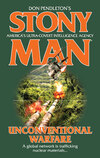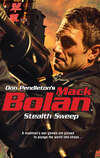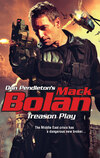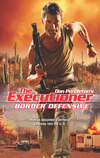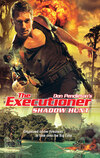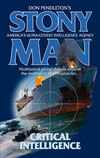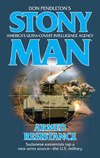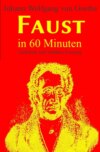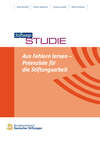Kitabı oku: «Unconventional Warfare», sayfa 3
CHAPTER FIVE
Rafik Bagdasarian shoved a fistful of local currency over the battered seat to the cabdriver and got out. He leaned in the open window of the passenger door and instructed the driver to wait for him around the block.
The taxi sped away, leaving him standing on the edge of an unpaved street. There was an open sewer off to his right and the stench was ripe in his nose.
Bagdasarian looked around.
He was on the opposite side of Brazzaville from the international airport. The dirt street was lined with shanties and what light there was escaped from boarded-up windows or from beneath shut-up doors.
A pair of mongrels fought over some scraps in a refuse pile several dozen yards up the road. Other than those dogs fighting, the stretch of grimy road was strangely deserted.
Faintly, Bagdasarian could hear the sound of a lousy stereo playing and then voices raised in argument. A baby started crying somewhere and farther away more dogs began barking in response.
Bagdasarian looked up at the sky, noting the low cloud cover. The road was thick with muck from the seasonal rains and it clung heavy to the soles of his hiking boots.
He set the attaché case he was holding down and reached around behind his back and pulled his pistol clear. He jacked the slide and chambered a 9 mm round before sliding the pistol into his jeans behind his belt buckle, leaving it in plain sight. He leaned down and picked up the case. He shifted his grip on the attaché handle so that his gun hand remained free.
He took a quick look around before crossing the road and stepping up to the front door of one of the innumerable shacks lining the road. He lifted his big hand and pounded three times on the door. He heard a hushed conversation break out momentarily before the voices fell quiet.
“Kabila?” Bagdasarian asked, speaking French. “Rafik.”
Bagdasarian felt a sudden damp and realized it had started to rain while he was standing there. Despite the wet he was still uncomfortably warm in his short-sleeved, button-down khaki shirt and battered blue jeans.
The short-sleeved shirt left his elbows and forearms exposed, revealing their thick covering of tattoos, his calling card.
The door opened slowly and a bar of soft, nicotine-colored light spilled out and illuminated Bagdasarian.
A silhouette stood in the doorway and the Armenian narrowed his eyes to take in the figure’s features. It was a male, wearing an unbuttoned and disheveled gendarme uniform. His eyes and teeth were sharply yellow against the deep burnished purple-black of his skin.
He held a bottle of grain alcohol in one hand, and the other rested on the pistol grip of a French MAT-49 submachine gun hanging from a strap slung across his neck like a guitar. He leaned forward, crowding Bagdasarian’s space.
Bagdasarian made no move to back up.
“You, Rafik?” the man demanded, also speaking French.
His breath reeked with alcohol fumes, and the light around him reflected wildly off the glaze in his eyes. His words were softly slurred but his gaze was steady as he eyed Bagdasarian up and down.
The finger on the trigger of the MAT-49 submachine gun seemed firm enough.
“Yes,” Bagdasarian answered. “Is Kabila here?”
“Colonel Kabila,” the man corrected.
“Is Colonel Kabila here?”
“You have the money?”
Bagdasarian lifted the attaché case, though he knew the man had already seen it when he’d opened the door.
The gendarme ignored the displayed satchel, his eyes never leaving Bagdasarian’s face. His hair was tightly cropped and Bagdasarian could see bullets of sweat beading on the man’s forehead. The smell of body odor was acrid.
“Give me the pistol.”
“Go to hell.”
The drunken gendarme’s eyes lifted in shock and his face twisted in sudden, instant outrage. He snapped straight and twisted the MAT-49 around on its sling, trying to bring the muzzle up in the cramped quarters.
Bagdasarian’s free hand shot out and grabbed the submachine gun behind its front sight. The big man locked his arm and pushed down, preventing the gendarme from raising the weapon. The gendarme’s eyeballs bulged in anger and the cords of his neck stood out as he strained to bring the submachine gun to bear.
“Leave him!” a deep bass voice barked from somewhere behind the struggling gendarme.
The man cursed and tried to step back and swing his weapon up and away from Bagdasarian’s grip. The Armenian stepped forward as the man stepped back, preventing the smaller man from bringing any leverage to bear.
An ability to call up instant explosive anger and balls like brass fixtures was the way Bagdasarian had risen to the top in the hyperviolent world of Armenian organized crime. He didn’t take shit. Even if it cost him his life.
They moved into the room through the door and Bagdasarian heard chair legs scrape against floorboards as men jumped to their feet. He ignored them, making no move for the butt of the 9 mm PPK plainly sticking out of his jeans.
The man grunted his exertion and tried to step to the outside.
Rafik Bagdasarian danced with him, keeping the gendarme’s body between him and the others in the smoky room. His grip on the front sling swivel remained unbroken. Finally the gendarme dropped his bottle and grabbed the submachine gun with both hands. The bottle thumped loudly as it struck the floor but did not break.
Liquid began to gurgle out and stain the floorboards.
“I said enough!” the voice roared.
The gendarme was already using both his hands to snatch the submachine gun free as the order came.
The Armenian released the front sling swivel and stepped to the side. The gendarme found his center of balance around the struggle abruptly gone and overextended himself. Already drunk, he toppled over backward and struck the floor in the pool of reeking alcohol spilling from his dropped bottle.
Cursing and sputtering, the man tried to rise.
Bagdasarian surveyed the room. He saw four other men in the same soiled and rumpled police uniforms, each one armed either with a pistol or a submachine gun. All of them were gaunt and lanky with short hair except for the bear of a man bearing the gold braid epaulets of an officer.
The man rose from behind a table and hurled a heavy glass tumbler at the gendarme Bagdasarian had spilled onto the floor. The glass struck the man in the face and opened a gash under his eye, high on a prominent cheekbone where Bantu tribal scars had been etched at puberty and rubbed with charcoal.
“I said leave him!”
The shock of being struck snapped the embarrassed man out of his rage. He touched a hand to the cut under his eye and held up his bloody fingers. He looked away from his hand and nodded once toward the man looming up behind the table before rising.
The officer turned toward Bagdasarian. “My apologizes,” he said. “My men worry about my safety.”
“Understandable, Colonel Kabila.” Bagdasarian nodded. “I worry about my own safety.”
“Come now, you are in the company of police officers.”
“Yes, I am,” Bagdasarian agreed.
“Foreigners are not usually permitted to carry weapons in our land.”
Bagdasarian threw the attaché case down on the table. “That should more than cover any administrative fees.”
“Is it in euros?”
“Francs,” Bagdasarian corrected.
Kabila nodded and one of the gendarmes at the table reached over and picked up the attaché case. He had a sergeant’s chevrons on his sleeve.
Bagdasarian saw there were two very young girls pressed up against the back wall of the shack. Their eyes were hard as diamonds and glittered as they took him in.
The gendarme sergeant pulled the case over and opened it. The sudden light of avarice flared in his eyes, impossible to disguise. Bagdasarian shrugged it off.
While the sergeant counted the stacks of French currency, Colonel Kabila reseated himself.
He snapped his fingers at one of the girls and she jumped to pick a fresh glass off a shelf beside her. She brought it over to the table and poured the colonel a fresh drink from an already open bottle. Bagdasarian could feel the intensity of her gaze.
Kabila regarded the Armenian through squinty, bloodshot eyes. He picked up a smoldering cigar off the table and dragged heavily from it. His men made no move to return to their seats. Kabila pulled his cigar out of his mouth and gestured with it.
“Sit down.”
Bagdasarian pulled out the chair from the end of the table opposite Kabila and eased himself into it. The two men regarded each other with coolly assessing gazes while the sergeant beside Kabila continued counting the money. Kabila lifted his new glass and splashed its contents back without changing expression.
“Shouldn’t a man like you be out selling drugs in the nightclubs?” Kabila asked.
“Shouldn’t you be out in the delta or back east, fighting?”
Kabila shrugged. “That’s what the army is for. I fight crime.”
“How’s it pay?”
“Not as well as you do, I hope.” Kabila smiled. He wasn’t smiling when he added, “For your sake.”
The gendarme sergeant looked up from counting the money secured inside the attaché case. Kabila’s eyes never left Bagdasarian. “Is it all there?” he asked.
“More.”
“More?” Kabila asked Bagdasarian.
“There’s a bonus in there. You’re going to have to travel outside the city.”
“Up river?” The colonel sounded incredulous.
“Yes.”
“I am a policeman.” Colonel Kabila smirked.
Bagdasarian followed the line of Kabila’s sight across the room to where the gendarme he had scuffled with stood glowering.
“Any way you want it, Colonel.”
“Yes. Yes, it usually is.”
Kabila leaned back from the table and stretched out his arm.
The girl who had poured his drink slid into his lap. She regarded Bagdasarian from beneath hooded lids. Bagdasarian guessed she could have been no older than fourteen. She was beautiful, her eyes so darkly brown they were almost black, but still nearly luminescent. The effect was disquieting. In America she would be a freshman in high school. In Congo-Brazzaville she was the paramour of a corrupt warlord four times her age.
Bagdasarian forced himself to look away.
The sergeant on Kabila’s right shut the briefcase and placed it on the floor of the shack underneath the table and at his colonel’s feet. Bagdasarian looked around the room. An expensive-looking portable stereo played hip-hop music featuring a French rapper. A bar stood against one wall and a motley collection of bottles sat on it, devoid of import tax stamps. Cigar smoke was thick in the room, and Bagdasarian was surprised to see several of the gendarme officers chewing khat, a narcotic root he had always associated with the Horn of Africa, as well as the more common draggar.
The Armenian placed his hands palm down on the table and pushed himself up. He rose slowly and nodded to the colonel, who didn’t bother to return the favor. Bagdasarian looked over at the gendarme who had opened the door. The man’s eyes were slits of hate.
Rafik Bagdasarian crossed the room, keenly aware of how many guns were at his back. He placed his hand on the door handle and slowly turned the knob. Coolly he swung it open and stepped out into the falling rain.
Nigeria
THE QUONSET HUTS HAD BEEN dropped into the clearing by a Sikorsky helicopter. The cover story had to do with oil exploration for Chevron, which was a prolific presence in the Niger Delta region.
The electronic intelligence for the program hadn’t been so lucky.
The four-man team had traveled upriver through snake-, crocodile-and pirate-infested waterways first by motor launch and then for four miles of bush breaking overland.
The satellite relay station was jointly funded through the NSA and the DEA for counterterror and antinarcotics trafficking operations throughout western sub-Saharan Africa. For the most part the marriage between law enforcement and raw intelligence gathering had proved successful.
The most glaring hole in the plan was the lack of a security element. The NSA, unlike its intelligence-gathering counterparts in the Central Intelligence Agency or the Pentagon, preferred a “below the radar” profile to one more centered on firepower.
Calvin Sloke, a six-year electronic-intelligence specialist, swatted a mosquito.
The flying bug was particularly big and had got that way, Sloke suspected, by helping its vampric self to liberal portions of the American’s blood.
“Got you, you son of a bitch!” Sloke shouted in triumph.
The bug was smeared like fruit pulp along his forearm just above his Timex Ironman wristwatch.
“Congratulations,” Selene Hoffman replied from behind him.
Her voice was thick with sarcasm. She didn’t much like Sloke after six weeks in the cramped quarters and had pretty much given up pretending otherwise.
“Screw you,” Sloke replied, voice artificially pleasant.
“In your dreams, dork.”
“Quitting smoking sure has done a lot for your personality.”
“Sorry my not dying is inconveniencing you.”
“Boy, has it.”
“Stow the bullshit,” Mark Ensign said as he entered the tech center.
The ex-Marine was the only one of the crew who’d been to Africa before, having served time in both Liberia and Somalia as a counterintelligence officer. He still kept in shape with daily routines of calisthenics that made the other techs nauseous just watching him.
“We get our signal today?” he continued.
“Coming up now,” Sloke said.
Overhead, in geosynchronous near-earth orbit, a Dong Fang Hong satellite of the People’s Republic of China made its daily pass. Like clockwork the Nigeria station would begin signals intercepts, or SIGINT, operations.
This operation, along with digital wiretaps of the satellite and cellular communications networks used by the criminal pipeline that moved cocaine and heroin from Mexico and South America through Africa, up to Armenia and into the European Union, was the primary responsibility of the Nigeria station.
“Where’s Dex?” Hoffman asked.
“Getting some rack time,” Ensign replied.
Jason Dexter was the hardware and systems engineer assigned to keep all the various highly classified components at the site working and working with each other. After six years with the U.S. Navy and then two more doing the same job with the Department of Defense’s Defense Intelligence Agency, he’d been quietly recruited into the Puzzle Palace.
High-strung, type A and nearly anorexic, the specialist was a mission-first workaholic who’d run one marriage into the ground and didn’t speak to his children. Despite this, or maybe because of it, he had a reputation as the premier field-operations guy in the Agency.
At that moment the door to the communications station opened and a figure appeared in the doorway, submachine gun held in his hands.
Ensign reached for the metal filing cabinet where he’d placed his holdout, an H&K MP-5. His fingers curled around the smooth metal handle of the drawer.
The figure in the doorway stepped to one side and a second form appeared in the entrance. Hoffman had time to look toward Ensign as he yanked open the drawer and reached inside. Sloke covered his head with his arms.
Ensign lifted the submachine gun, tried to turn as his thumb snapped the fire-selector off safety and onto full auto.
The men in the doorway opened fire.
Bullets streamed through the claustrophobic space in a hailstorm of lead. Rounds chewed through computer screens and electronics equipment, shattering cases and housing like sledgehammers.
Sparks flew in wild rooster tails and miniature columns of smoke spewed upward as shards of plastic and stamped metal ricocheted around.
The cowering Sloke caught a long burst that slammed into him with relentless force, gouging out the flesh of his side and back, shattering his ribs and scrambling his internal organs like eggs in a skillet. He screamed and flopped under the impact until a triple burst of soft-nosed slugs shattered his jaw, cracked his temple and punched two holes through the temporal bone of his skull.
He slumped instantly, banging his head on the tabletop before flopping onto the diamond-plate flooring panels. His blood spilled out like flood waters.
Hoffman rose to her feet in a half crouch, a hapless, helpless, terrified look freezing her face into a mask of fear. Her hands came up as if she could ward off the bullets with such a feeble attempt.
Her left hand lost the pinkie and index finger as the rounds sliced through her. Her right palm blossomed with blood as a round slammed through the muscle under her thumb and lodged in the bones of her wrist.
She opened her mouth to scream and a single round slid into her torso, slicing apart her diaphragm and venting the air in her lungs. She gasped weakly and folded like a lawn chair in time to catch six more bullets across her chest and throat.
The intelligence agent fell backward, her blood splashing her computer screen, and tripped over her chair. She struck the ground like a kid falling out of a tree and gasped, fighting for breath through ruined lungs and larynx.
Her eyes filmed gray in an instant and she fell slack. The oxygen-starved muscles of her abdomen spasmed once and a cascade of dark blood bubbled out of her mouth and streaked her face.
Ensign leveled the H&K, his finger tight on the trigger.
He felt two bullets strike him like the impacts of a baseball bat, one in his thigh and a second low in his gut. He squeezed the MP-5’s trigger and the submachine gun roared to life in his hands.
His rounds sprayed wildly in a loose pattern, most of them burning off harmlessly into the ceiling.
A second burst caught him in the chest and shoulder, smashing him back against the filing cabinet. The kinetic force jerked his arm, and the muzzle of the blazing SMG dropped.
Two rounds struck one of the attackers in his right arm, slicing through the biceps and cracking the humerus bone beneath, while the other sliced a gouge of meat an inch wide off the man’s rib cage. The Nigerian killer grunted with the impact and staggered.
The second gunman hosed the ex-Marine down, stitching a line of slugs in a diagonal pattern from hip to neck and unzipping the American’s stomach in the process.
Ensign rebounded off the filing cabinet and dropped to his knees, the H&K falling silent. A final burst from the unwounded killer sliced his face off his skull, leaving only a bloody cavity in its place.
The corpse fell forward and struck the ground with a wet slap.
Colonel Kabila stepped into the hut, a bloody panga knife in hand, cigar burning in his mouth.
He looked at his wounded police officer and jerked his head to the side, indicating the man should go.
“Dress your wounds,” he ordered, and the man hurried to obey.
Kabila took a deep drag and blew smoke out of his wide nostrils like a dragon. He looked at the other police officer and lifted his panga. The blade of the heavy bush tool was smeared black with blood.
“Get to work,” he said.
Twenty yards away Dexter huddled in the bush, hidden from sight.
CHAPTER SIX
Suburbs, Washington, D.C.
The phone rang.
Hal Brognola came awake instantly. The director of the Special Operations Group and head of Stony Man Farm sat up in bed and snapped on the lamp at his bedside table. His wife of some thirty years moaned in protest and rolled away.
The phone rang again.
Getting oriented, the director of America’s most sensitive covert operation group looked at the table and tried to determine which of his two phones was ringing. The first phone was his home and it often rang when some matter from his position at the Justice Department needed urgent attention.
The second phone was a Secure Mobile Environment Portable Electronic Device, or SME PED. The combination of sat phone and PDA allowed the wireless transmission of classified information and conversations.
When that phone rang then Brognola knew without question that the call was in reference to the Stony Man program. It would mean that somewhere in the world something had gone very wrong and that a decision had been made at the very highest level that resolution was only to be found at the muzzle of a gun.
The Stony Man teams were the very best guns in the business.
Brognola blinked and phone chirped again. It was the SME PED.
Time to go to work, he thought, and picked up the secured device.
“Go for Hal,” he said.
Things started to roll.
Stony Man Farm
CARMEN DELAHUNT HAD CQ duty at the Farm.
CQ was a military acronym for “command of quarters” and it simply meant that she had drawn after-hours duty. Despite not having the field teams on any active assignment at that precise moment, Stony Man was still a 24/7 operation and as such the Farm was fully staffed around the clock.
Secure in the Communications Room of the Farm’s Annex, the fiery redhead and former FBI agent was monitoring updated intelligence situation reports, military communications traffic and twenty-four-hour cable news channels.
While monitoring all this sensory input, Delahunt casually whipped through page after page of challenging Sudoku puzzles. She was a multitasking machine driven by a sharp, type A personality engine.
On the top of the desk the duty phone blinked into life and then rang. Setting down her coffee cup, she snatched up the receiver.
“Farm,” she said. Then, after a pause she continued, “Good morning, Hal.”
She cocked a head as the big Fed began talking. Her fingers flew across the keyboard in front of her as she began pulling up the latest information on West Africa in general, the Congo in specific, focusing on the terrorist and criminal operatives in that area and a project known as Lazy Titan.
Satisfied she was up to speed, Brognola hung up in his suburban D.C. home and began getting dressed.
Once off the phone Delahunt made two priority calls, both to other locations on the Stony Man facility. The first was to inform Jack Grimaldi, chief pilot for the covert project, that he was needed ASAP to take a helicopter into Wonderland on the Potomac and ferry Brognola to the Farm.
The second call went to Barbara Price.
BARBARA PRICE, Stony Man’s mission controller, opened her eyes.
She awoke clearheaded and alert, knowing exactly where she was and what she needed to do.
There was a war being fought in the shadows and like the ringmaster of a circus, she was at its epicenter. Her eyes went to the window of her bedroom. It was dark outside. She looked over to her bedroom table and noted the glowing red numerals of her digital clock.
She had been asleep for a little over four hours. She sat up and pushed a slender hand through her honey-blond hair. She felt revitalized after her power nap and with a single cup of Aaron “Bear” Kurtzman’s coffee she knew she’d be ready to face another day.
She got out of bed and smoothed her clothes before picking up the copy of the Washington Post she had placed by her bed. The headline jumped out at her as she stepped out into the upstairs hallway of the Stony Man Farm main house.
Rebel Forces Invade Congo
Late yesterday afternoon the Congo was rocked by violence as insurgents under command of the infamous Gen. Nkunda took control of a region on the upper river. Human rights groups are worried as communication with the area has been cut off…
Disgusted, Price stopped reading. She had too much on her mind at the moment to worry about politics as usual in Africa.
She frowned. The name “General Nkunda” was unfamiliar. If there was a new player trampling through national playgrounds then she needed to be on top of it. She resolved to have her computer wizard Akira Tokaido see if Stony Man had any files on the man.
As she walked down the hall and took the stairs to the main floor of the farmhouse she began clicking through options and mentally categorizing her tasks. She had men on standby, preparing to go into danger, and like the maestro of a symphony it was her responsibility to coordinate all the disparate parts into a seamless whole.
She was in the basement and heading for the rail system that connected to the Annex when the cell phone on her belt began to vibrate. She plucked it free and used the red push-talk button to initiate the walkie-talkie mode on the encrypted device.
“This is Barb,” she said, voice cool.
“Barb,” Carmen Delahunt began, “Hal called. We have a situation.”
“Thanks, Carmen,” Price told the ex-FBI agent. “I’m in the tunnel and coming toward the Annex now.”
“See you in a minute,” Delahunt said, and signed off.
Price put her phone away and got into the light electric railcar. The little engine began to hum and Price quickly picked up speed as she shot down the one-thousand-foot tunnel sunk fifteen feet below the ground of Virginia’s Blue Ridge Mountains.
Things were starting to click, and Price could feel the tingle she had first felt as a mission controller for long-range operations conducted by the National Security Agency. It was there she had made her bones in the intelligence business before being recruited by Hal Brognola to run logistics and support at the more covert Stony Man operation.
It had been quite a promotion, she reflected as the railcar raced down the subterranean tunnel past conduit pipes and thick power cables toward the Farm’s Annex, which was camouflaged underneath a commercial wood-chipping facility.
Stony Man had operated as a clandestine antiterrorist operation since long before the infamous attacks of September 11 had put all of America’s military, intelligence and law-enforcement efforts on the same page. As such, Stony Man operated as it always had: under the direct control of the White House and separate from both the Joint Special Operations Command and the Directorate of National Intelligence.
Stony Man had been given carte blanche to operate at peak efficiency, eliminating oversights and legalities in the name of pragmatic results. It also, perhaps most importantly, offered the U.S. government the ability to disavow any knowledge of operations that went badly. Sometimes the big picture could provide a very cold and unforgiving snapshot.
This left Stony Man and its operators particularly vulnerable to certain types of exposure. One hint of their existence in a place like MSNBC or the New York Times could lead to horrific outcomes.
The electric engine beneath her seat began to power down and the railcar slowed to a halt. She pushed the morose reflections from her mind as she prepared to enter the Annex building.
Things were ready to roll hot; she could not afford to be distracted now. She stood and stepped out of the car. Fluorescent lights gleamed off linoleum floors and a sign on the whitewashed wall read Authorized Personnel Only. Price input the code on the keypad and reached over to open the door to the tunnel.
After passing through the door, she was met by the wheelchair-bound Aaron Kurtzman. The big man reached out a hand the size of a paw and gave her a steaming mug of coffee. She eyed the ink-colored liquid dubiously.
“Thanks, Bear. That’s just what I’ve been missing—something that can put hair on my chest.”
The pair of them had exchanged that same greeting so many times it came to feel like a Groundhog Day moment. Both took comfort from the repetition.
Kurtzman turned the wheelchair and began to keep pace with the female mission controller as they made for the Communications Room.
The former Big Ten college wrestler lifted a massive arm across a barrel chest and pushed his glasses up on his nose beneath a high forehead with a deep horizontal crease. Price had once teased him that the worry line was severe enough for him to be awarded a Purple Heart.
He’d earned his Ph.D. from the University of Minnesota. He was a Stony Man veteran who had been with the Farm since the beginning, and his wheelchair was a constant testament to his dedication.
“McCarter just called for Phoenix,” he said, his voice a low rumble. “They’ve set up rendezvous with Encizo and James. Carl did the same for Able. They’re in place and ready to transport if we need them. They’ve been informed of the attack on NSA station Lazy Titan and the possibility of a survivor.”
“Good,” Price said. She took a drink of the strong coffee and pulled a face. “I’ll alert Hal, then. All we need is the go-ahead from the President.”
The pair entered the massive Communications Room and into a maelstrom of activity. Price paused at the door like a commander surveying her troops. She liked what she saw.
Kurtzman glided over to his work area, where it looked as if a bomb had gone off. His desk was covered in faxes, paperwork and the exposed wiring of half a dozen devices. Next to his desk, fingers flying across a laptop while monitoring a sat com link, Akira Tokaido bobbed his head in time to the music coming from a single earphone. The lean, compact hacker was the youngest member of Stony Man’s cybernetics team and the heir apparent to Kurtzman himself. The Japanese-American cyberpunk had at times worked virtual magic when Price had needed him to.
Across the room from Tokaido sat his polar opposite.
Professor Huntington Wethers had come to the Stony Man operations from his position on the faculty of UCLA. The tall, distinguished black man sported gray hair at his temples and an unflappable manner.
He currently worked two laptop screens as a translation program fed him information from monitored radio traffic coming out of France.
Carmen Delahunt walked through the door of the Communications Room. The ex-FBI agent made a beeline for Barbara Price when she saw her boss. The only female on the Farm’s cyberteam, she served as a pivotal balance between Tokaido’s hotshot hacking magic and Wethers’s more restrained, academic style.
